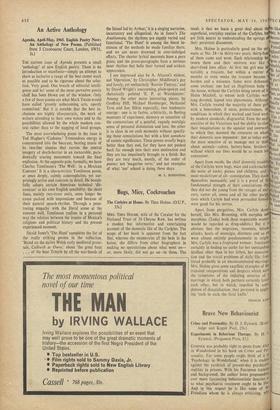An Active Anthology
THE current issue of Agenda presents a small `anthology' of new English poetry. There is no introduction or manifesto—simply an attempt to show as inclusive a range of the best recent work as possible and to be rigorous about the selec- tion. Very good. One breath of editorial intelli- gence and lo! some of the most pervasive poetic chaff has been blown out of the window. Only a few of these poems.are what Mark Twain would have called 'gravely unbecoming acts, openly committed.' But it is notable that the best in- clusions are highly idiosyncratic, the. work of writers attending to their own voices and to the possibilities allowed by the whole modern con- text rather than to the nagging of local groups.
The most overwhelming poem in the issue is Ted Hughes's 'Cadenza.' Tremendous energy is concentrated into the buoyant, beating music of its two-line stanzas that carries the central imagery of death-horror in an inexorable, para- doxically soaring movement toward the final explosion. At the opposite pole, formally, we have Charles Tomlinson's 'The Well: in a Mexican Convent.' It is a characteristic Tomlinson poem, at once deeply, calmly contemplative, yet sur- prisingly active and concrete in detail. He beauti- fully adapts certain American technical 'dis- coveries' to his own English sensibility; the short lines, mainly two-stress units, seem longer be- cause packed with impressions and because of their natural speech-rhythm. Through a pene- trating empathy with the literal scene at the convent well, Tomlinson realises in a personal way the relation between the ironies of Mexico's religious and political history and the present experienced moment.
David Jones's 'The Hunt' completes the list of the really striking poems in the collection. `Based on the native Welsh early mediaeval prose- tale, Culhwch ac Owen,' about 'the great hunt . . . of the bear Trwyth by all the war-bands of the Island led by Arthur,' it is a singing narrative, incantatory and allegorical. As in Jones's The Anathemata, the rhythms are supply varied and functional. 'The Hunt' is among the finest in- stances of the methods he made familiar there, and we are never drowned in over-indulged effects. The shorter lyrical moments have a pure grace, and the prose-paragraphs have a nervous inner rhythm that belie their formal and archaic 'appearance.
I am impressed also by A. Alvarez's violent, sad 'Operation,' by Christopher Middleton's gay and lovely, yet melancholy 4Rentier Fantasy,' and by David Wright's unassuming, plain-spoken and rhetorically pointed 'E. P. at Westminster.' Among the other more interesting pieces, by Geoffrey Hill, Michael Hamburger, Nathaniel Tarn and Jon Silkin especially, two tendencies emerge: one is to fasten, arbitrarily, to fleeting moments of experience, memory or sensation all the connotations of a painful, vaguely nostalgic sense of personal dislocation and loss; the other is to close in on such moments without specify- ing those connotations but with a hint somehow of cosmic significance. These poems usually begin better than they end, for they have not pushed back far enough into their own motivation and they are too impatiently brought to a finish. But they are very much, mostly, of the order of poems; not `magazine verse,' and not examples of what `our' school is doing these days.
M. L. ROSENTHAL


































 Previous page
Previous page